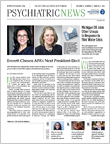A study published last month in JAMA Psychiatry found that the older a woman is at menopause, the lower her risk for depression later in life. The findings suggest a potentially protective and antidepressant effect of increasing the duration of endogenous estrogens exposure.
“Women have twice the risk of developing geriatric depression compared with their male counterparts,” said the study’s senior author, Eleni Petridou M.D., Ph.D., M.P.H., a professor of preventive medicine and epidemiology at the National and Kapodistrian University of Athens in Greece.
Numerous evidence has shown that women are more likely to experience symptoms of depression during intense fluctuations of hormones (for example, premenstrual, postpartum, and perimenopausal periods). Because previous studies have suggested that estrogens have neuroprotective and antidepressant effects, Petridou and colleagues hypothesized that longer exposure to estrogens might decrease the risk of depression later in life.
To test their hypothesis, the researchers conducted a meta-analysis of 14 published studies (including 67,714 women) that focused on the association between age at menopause or the duration of the reproductive period and the risk of subsequent depression.
Overall, the analysis revealed that increasing age at menopause and duration of the reproductive period were associated with a reduced risk of depression in postmenopausal women—an effect that remained after controlling for premenopausal depression and hormone therapy use. Those whose menopause began when they were 40 or older had a 50 percent decreased risk for subsequent depression than those with premature menopause.
“Specifically, the dataset showed that for every two years of age increase at the age of menopause or, similarly, two years longer the duration of the reproductive period from menarche to menopause, there is a decreased postmenopausal risk for depression by 2 percent,” Petridou said.
The researchers wrote that the findings “indicate that a shorter exposure to endogenous estrogens that is linked to a longer duration of estrogen deficiency … increases the risk for Subsequent late-life depression and emphasizes the importance of the neuroprotective and antidepressive properties of endogenous estrogens.”
According to Petridou, the results of the study suggest that women with premature menopause (under 40 years of age) should be regularly screened for postmenopausal depression. “The aim is to identify depressive symptomatology among these women at an earlier stage and more effectively tackle their treatment needs,” she said.
The researchers concluded that “if confirmed in prospective and culturally diverse studies controlling for potential confounders and assessing depression via psychiatric evaluation, the findings could have a significant clinical effect by allowing for the identification of a group of women at higher risk for depression who may benefit from psychiatric monitoring or estrogen-based therapies.” ■
An abstract of “Association of Age at Menopause and Duration of Reproductive Period With Depression After Menopause” can be accessed
here.
